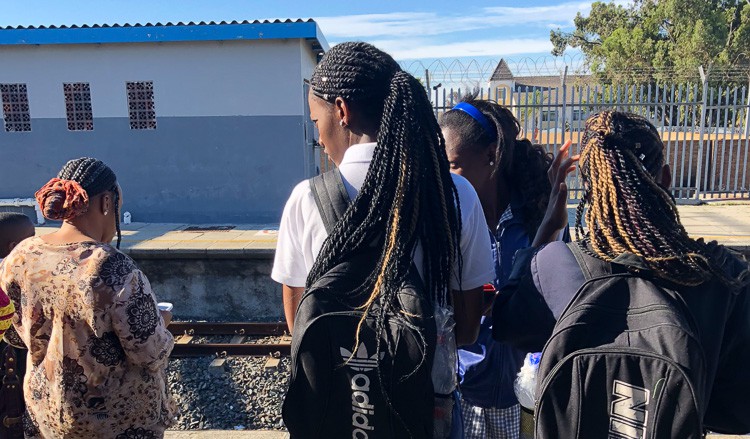Metrorail is failing us, say school children who miss classes daily
Commuters will just have to get up earlier, says Metrorail
Cape Town learners are missing school lessons daily because of problems with trains. But there’s no “quick fix”, says Metrorail.
On the Northern line at Parow station learners wait from 6:30am to get to schools in Maitland, Salt River, Cape Town and the southern suburbs. They are often late. Trains are cancelled, delayed and often stop between stations. Sometimes when the trains come after a delay the carriages are so full that the children are unable to board.
Questioned by GroundUp on Tuesday, four learners from Salt River High School said most of the time they missed at least the first two periods of their school day. They had to borrow other learners’ books to copy work they missed. On Tuesday, they arrived at Salt River at 9:30am though they had been waiting for a train since 7am.
A grade 8 learner said she was scared to go to her teachers to ask questions on the subjects she missed. She said the teachers seemed not to understand the problems with the trains. Learners were scolded for being late and sent to detention in the afternoons after school.
A grade 12 learner said she had been late for school every day of last week.
She said she did not feel safe on the train and had seen people being robbed.
“My parents are concerned about the way trains have been operating on the Northern line but we do not have a choice. Trains are affordable. I pay R150 for the whole month for a train ticket as compared to a taxi fare of R13 daily per trip.”
“My parents can’t afford busses or taxis. I am also embarrassed that as Head Girl I need to be exemplary but I am doing the opposite… all because of the trains. Metrorail have let us down.”
When GroundUp took the Northern Line from Salt River on Tuesday afternoon there were people drinking, playing cards and smoking marijuana. There were no security guards or police to be seen.
Commuters using the Century City line and the Southern line also complained about bad service.
GroundUp asked Metrorail spokesperson Riana Scott if Metrorail was fixing problems on the Northern, Southern and Century City lines. (The train service on the Central line is suspended.)
Scott answered: “Western Cape is operating at 60% capacity having lost 101 carriages to arson and vandalism since October 2015. As a result punctuality and reliability have declined, forcing many desperate commuters to spill into MetroPlus carriages. The region has only 54 train-sets to service a timetable designed for 84 train-sets hence the many cancellations”.
“There is no quick fix to repair a system left to deteriorate over 50 years.”
Scott said R172 billion had been allocated to modernise the entire rail system over 20 years. New trains for Cape Town were expected by 2019-2020.
“We have recognised that trip durations are longer due to safe operational alternatives that have to be instituted,” she said.
“Like motorists, train users will unfortunately have to rise earlier to get to work/school on time.”
On security, Scott said Metrorail was collaborating with police. “Police/security cannot be everywhere at once – instead they are posted according to predetermined priority areas,” she said.
Noncedo Madubedube of Equal Education (EE) Western Cape and Sinekhaya Mbengo (EE City Bowl) say the organisation is collecting testimonies from learners. “What we can say from engaging with learners is that there are a lot of learners affected. This becomes a financial burden for their families because trains are the cheapest and most convenient mode of transport.”
“Metrorail does not seem to have adequate security personnel which means learners travelling too early or late because there aren’t enough trains running can be robbed and assaulted while waiting for trains.”
“Learners also get home late and are unable to effectively do their homework and catch up on missed class time.”
Support independent journalism
Donate using Payfast

Don't miss out on the latest news
We respect your privacy, and promise we won't spam you.
Next: PRASA has no solutions to rail crisis, say MPs
Previous: SASSA files explosive papers in court
© 2018 GroundUp. 
This article is licensed under a Creative Commons Attribution-NoDerivatives 4.0 International License.
You may republish this article, so long as you credit the authors and GroundUp, and do not change the text. Please include a link back to the original article.

